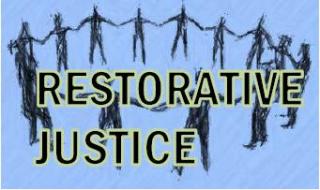Restorative Justice

Restorative justice is a process to involve, to the extent possible, those who have a stake in an offense that has been committed and collectively to identify and address harms, needs, and obligations in order to heal and restore the community. Often this work is done before criminal charges are filed and instead of proceeding with a court case. Restorative justice programs subscribe to these principles: crime is a violation of people and relationships; crime creates harms, needs, and obligations; and those most affected should be meaningfully included and empowered.
Restorative Justice is an integral part of the Northwestern District Attorney's justice practices. The District Attorney sits on the state-wide Restorative Justice Advisory Committee and advocates for the incorporation of restorative practices into the resolution of cases throughout his district.
JUVENILE JUSTICE
All juvenile dispositions attempt to incorporate restorative practices to help youth rehabilitate, deepen their understanding of the impact of their behavior, and forge a positive connection with the community. Such practices may include:
- restitution
- community service
- apology to the individual directly affected
- victim-offender dialogue in restorative circle
- appropriate counseling (for example substance abuse, family issues etc.)
- education on impact and triggers of offending behavior
- skill-building to help to prevent recidivism and deepen understanding of impact of behaviors
DISTRICT COURT
Beginning in the fall of 2020, the NWDA and six police departments partnered with Communities for Restorative Justice (C4RJ) to increase access to restorative justice in Hampshire County by diverting adults out of the criminal justice system and into restorative justice. [ PRESS RELEASE]
The participating police departments are Amherst, Easthampton, Hadley, Northampton, South Hadley, and Ware. Additionally, the Northwestern District Attorney’s Office can refer cases from any police department in Hampshire County.
“Our office, which currently runs two pre-arraignment diversion programs out of the district courts, welcomes C4RJ and the opportunity it provides to divert cases out of the criminal justice system and into a community space that can lead to real transformation for all involved, including the offender, the victim, and the police officer. I am proud to join with our local police chiefs who jumped at the opportunity to send cases directly into restorative justice before a charge issues. We all understand that restorative practices have important and deep historical roots and must be an integral part of our future.” District Attorney Sullivan
Participating police departments or the DA’s Office works with C4RJ volunteers to determine which cases are appropriate for restorative justice. Those offenders are then diverted from the court system to C4RJ prior to the issuance of a charge. Additionally, a case that has already entered the court system can also be diverted at the pretrial stage.
For more information about Communities for Restorative Justice, visit www.C4RJ.org. If you are interested in volunteering for C4RJ, please visit: https://www.c4rj.org/join-us/volunteers.

